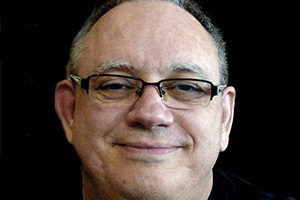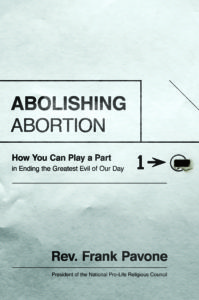

Abortion is the hot-button issue of the day. Who among us can rationally argue that the protection of human life — at its core and despite wars of politics or economics — is NOT inherent to human nature? Why do we have so many ERs? Why do we condemn murder, manslaughter and cannibalism?
In his new book, “Abolishing Abortion: How you can play a role in ending the greatest evil of our day,” Fr. Frank Pavone, national director of Priests for Life, hits as powerfully as can be managed with human words.
He quotes Mother Teresa as one who did not accept the false taboo against speaking the right thing in public. At the 1994 National Prayer Breakfast, standing before then-President and Mrs. Clinton, she said, “I feel that the greatest destroyer of peace today is abortion because it is a war against the child, a direct killing of the innocent child, murder by the mother herself. And if we accept that a mother can kill even her own child, how can we tell other people not to kill one another?”
[quote_box_right]
‘Abolishing Abortion: How You Can Play a Role in Ending the Greatest Evil of our Day’
Author: Fr. Frank Pavone
Publisher: Thomas Nelson
Length: 256 pages
Release Date: Aug. 18, 2015
ISBN: 978-1400205721
Order from: priestsforlife.org/store
[/quote_box_right]
In my most right conscience or imagination, I cannot think of anything else to say about the issue. The courage exhibited by Mother Teresa is the point Fr. Pavone is driving — that we are never to accept that false taboo, especially because of something so misunderstood as “separation of Church and state.”
The United States Constitution guarantees us the right to freedom of religious expression and prohibits the state from ever imposing a singularly-sanctioned religion on the people. Gaudium et Spes, (1966) states: “(The) split between the faith which many profess and their daily lives deserves to be counted among the more serious errors of our age.” The plain fact is, it is our obligation to speak out.
Fr. Pavone writes about how faith can transform politics, if we let it, indeed if we demand it. Here is an example: progressivism is our politics today, that notion that the human being is good simply because of its humanity. Humans are thus perfectible and what better way to perfect human beings than through the power of the government, to mold and shape that perfectibility. God is not needed.
But as Fr. Pavone states, faith can transform politics and nothing so cripples progressivism as the sanctity of the individual person, whose singular dignity is derived from the Creator, and who is, in fact, the imago dei, the image of God.
Surprisingly, all of this is only Chapter One.
Fr. Pavone guides us through the “World of Roe,” that postmodern world where all things are relative and nothing is absolutely true. As any good pastor and prophet he calls us to the time of repentance, a time to renounce our cowardice and our silence.
The only real problem I had with Fr. Pavone’s book: it is so detailed and condensed with rational truth that not a single proverbial stone is left unturned and it will cause readers of good conscience to weep.
He covers the spiritual imperative, freedom of speech, the tax code and how NOT to fear the IRS. He teaches us how to overcome double-think and double-speak (the progressive code) and how to battle past the postmodern disconnect. He points to the clergy and their willful passivity at the fear of losing tax-exempt status.
And THEN, Fr. Pavone gets serious.
He shows us the myriad ways to speak out, to go viral and visual, to conquer the internet and the streets. Change the argument, he proclaims, make it about life (I say make it about the human “life-cycle”), take the moral high ground, not in judgment but in all Christian love.
Of all the books I’ve read and reviewed to date, this is the most powerful.
My ultimate suggestion, here, is not to buy a single copy of this book but buy many and give them to everyone because this book is the hope on the horizon.






